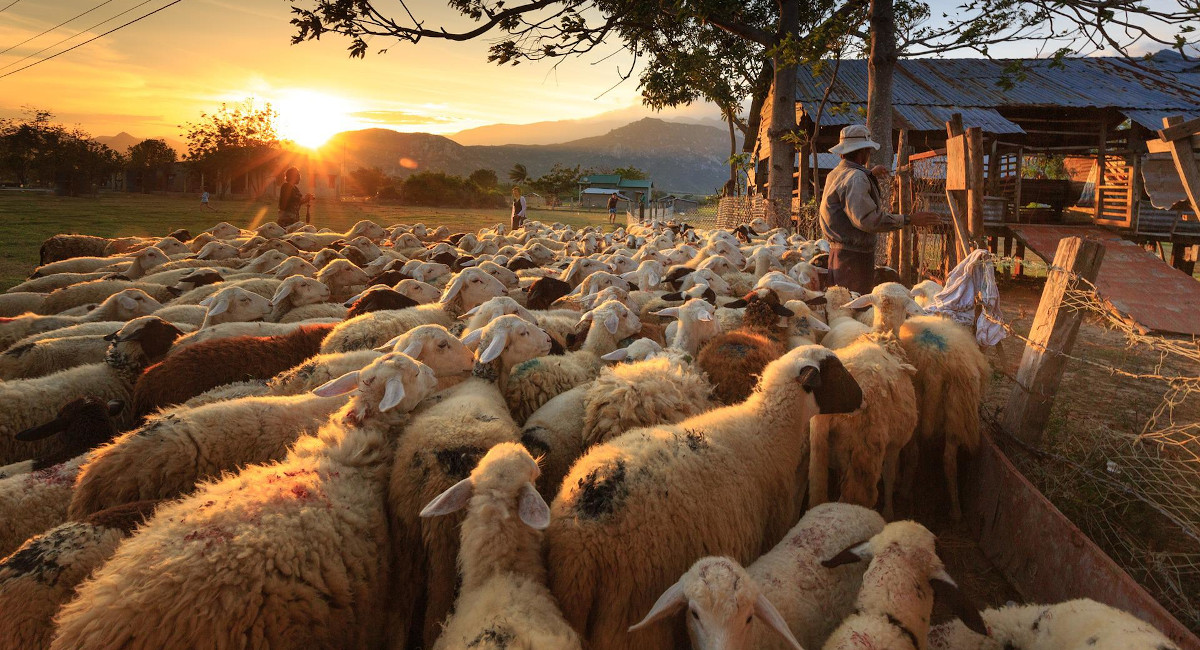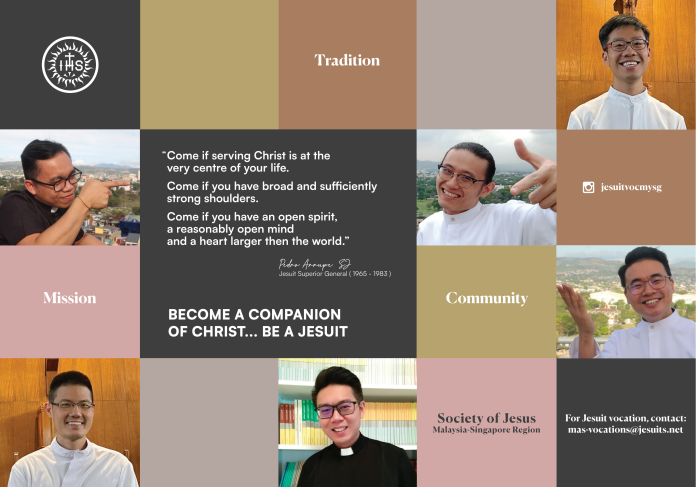
Image by Quang Nguyen Vinh from Pixabay
On the Third Sunday of Easter, we heard in the Gospel the conversation between Jesus Christ and Peter (Jn 21:15-19). Jesus asks Peter three times: “Do you love me?”
What is love? St Ignatius puts this explanation of love in the note before the exercise on the Contemplation to Attain the Love of God (SE 230-231): “Love ought to be put more in deeds than in words.”
Genuine love stretches us; when we love someone, we are carried to a space of selfless love and vulnerability. In that conversation between Jesus and Peter, in that space of encountering love and being vulnerable, Jesus forgives Peter’s denial, and renews his vocation to “feed my lambs, look after my sheep, and feed my sheep”. Peter’s life-vocation is affirmed and restored, to love and care for the lambs and sheep that belong to the Good Shepherd.
Our Easter celebration reminds us that each one of us is like the sheep, for whom the Good Shepherd laid down His life on the cross. Encountering the selfless, sacrificial act of God’s love and care for us and our world, we encounter love and our vulnerability. In our life-vocation journey, we are the meek sheep that belong to Christ Jesus. As the sheep, we are called to listen to the Good Shepherd’s voice and follow Him more closely (SE 104).
Pope Francis describes “the broader meaning of ‘vocation’ within the context of a synodal Church, [as] a Church that listens to God and to the world”. In following Christ, we are called to shepherd one another with the Gospel values in the Lord’s vineyard and mission. Pope Francis further speaks about vocations as “making God’s dream come true.” Through our vocation, we respond to God’s personal desire for us and help build up the Kingdom of God here and now.
It is consoling and refreshing to see some young faces of Malaysia-Singapore (MAS) Jesuits in our vocation promotion poster. There are still many younger men who have the courage to say: “Here, I am Lord.” These young men remind me of my younger years. As I grow older, I can feel that I am not alone in this journey of constantly responding to God’s call. They are my community, collaborators, and “friends in the Lord”. In our life-vocation journey, Pope Francis assures us that, “As Christians, we do not only receive a vocation individually; we are also called together. We are like the tiles of a mosaic. Each is lovely in itself, but only when they are put together do they form a picture.”
Today’s complex and challenging world can overwhelm us. Everywhere we see human fragility: families who are displaced from their home and even separated from each other due to war, conflicts, and even climate change. Despite the hopeful signs of recovery from the Covid-19 pandemic, the world crisis is not yet over. In fact, it is further worsened by the broken supply chain and the rising cost of living due to the Ukraine-Russia war. Closer to home, we may be sad, disheartened, and hurt by the unfolding local news of a prominent Catholic in Singapore sentenced to five years in prison for sexual offences against two teenage boys committed some 15 years ago. Archbishop William Goh has written a pastoral letter on “seeking God’s merciful healing and vigilance in protecting our young”. In that letter, the Archbishop humbly asks for an apology on behalf of the Church. He reminds us that this incident is “a wake-up call” on the journey of “conversion [that] is required of the entire Church”. Our Regional Superior, Fr Christopher Soh SJ, has also written a letter in response to the painful news, in which he invites us to “find ways to open up safe and prayerful spaces among us”, to reach out to those “who may also be hurting … during this difficult and confusing time”, and to “resolve to take all necessary steps to continue cultivating a consistent culture of protection, particularly in all our communities and works”. For hurting Catholics, Ann Yong has put together online resources in times of scandal to help us find support and a safe space online.
In his August 2021 letter on “the implementation of minimum standards of safeguarding in the Society of Jesus”, Fr General Arturo Sosa SJ invites us to reflect deeply on the second Universal Apostolic Preference of Walking with the Excluded, specifically our commitment “to help eliminate abuses inside and outside the Church… [which] includes the adoption of clear policies for the prevention of abuse, the ongoing formation of those who are committed to mission, and serious efforts to identify the social origins of abuse”.
In December 2021, The MAS Safeguarding Office put in place a team to work on these minimum standards so we can effectively promote a consistent culture of protection that safeguards vulnerable persons, including minors and young people. This safeguarding work continues to build on the MAS Code of Conduct even as it updates the MAS Protocol on Professional Boundaries.
Love and safety are basic human needs, and safeguarding is everyone’s task and responsibility. The Catholic Safeguarding Institute suggests the tripod of relational safety model of safe-self, safe-community, and safe-ministry. It proposes that, “Safeguarding assumes a safe self lived out in a safe community towards a safe ministry in the service of the people of God.” In other words, safeguarding is part of our life-vocation and mission to follow the Good Shepherd and to care for his sheep. In this mission, we are called to cultivate a safe culture that promotes and fosters a safe environment, as part of God’s dream and desire for us to become stewards of God’s creation and to care for our common home.








